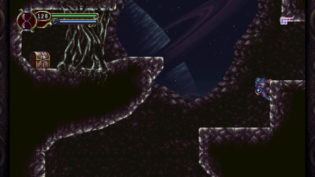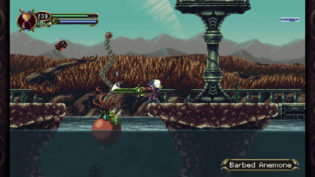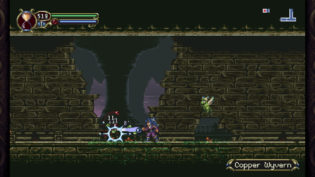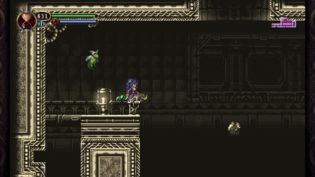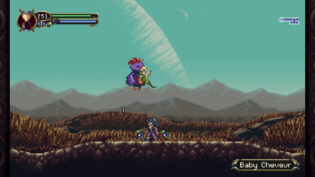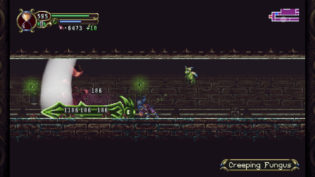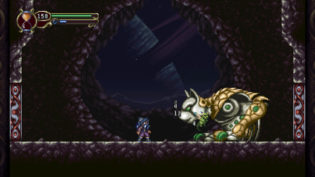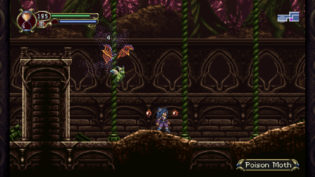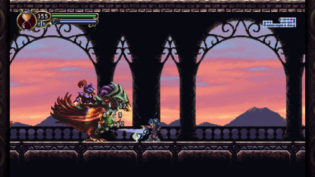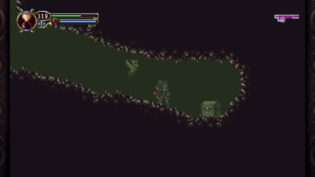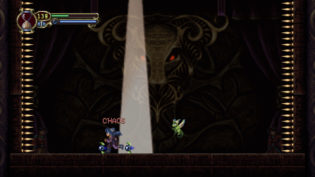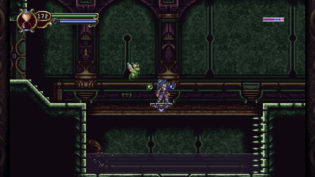While I love good exploration focused metroidvania titles and Timespinner is one of them, I have not played it until now, more than 5 years since it was released. I don’t even remember what made me doubt it’s worth playing. Maybe reviews that mentioned really poor writing (which turned out to be true, as I’ll cover later). Maybe the amount of metroidvania titles that started going into hard combat focus and all of the still popular “souls-like” elements, something I usually dislike, and I didn’t trust this game to not go that way. Either way, it wasn’t until after the sequel to this game was announced that I’ve decided to give it another look. And wasn’t until I heard someone describe it as “indie Castlevania: Order of Ecclesia” that I got really curious. Either way, I’m glad that I did.
As I’ve already mentioned, Timespinner is an exploration focused action adventure platformer, aka a metroidvania. And due to its many similarities to Order of Ecclesia that are indeed here, it’s more of a “-vania” than some other games in the genre. How does that comparison work? Well, just like in OoE, instead of finding weapons, you find special items – orbs, in case of Timespinner. Once it’s found, it can be assigned to any or both your hands. Each of these orbs have different attack pattern, speed, damage and damage type and eventually you get an ability to have several sets of them equipped with a button press to quick swap them. Due to that, it’s entirely up to you if you want to have a symmetric attack, where both orbs are same, or mix and match whatever crazy combination you like. One thing of note, though, is that unlike OoE, most orb attacks don’t drain magic, so you usually use that for spells.
Orbs, familiars (also a recurrent Castlevania idea) and the main character herself can gain experience and level up. You do get some “traditional” equipment for protective gear. And you do get items, like your potions and antidotes and all the usual Castlevania-like stuff. Even defeating bosses produces some energy thing that just like orbs in Castlevania fully heal you right away. Timespinner isn’t shy about its influences, but it applies the ideas from its inspirations very well for the most part.
Exploring is fun and as title would suggest eventually involves time as well, allowing you to experience locations across not just one time period. Some actions in the past affect the future… you know the drill. It’s nothing extremely deep or incredible, but there are some neat problem solving ideas in the game and it’s only a shame that there’s not more. Combat balance is mostly well done as well and while I didn’t love the very late game areas in terms of damage received and dealt, it’s not out of the realm of what “IGAvania” Castlevania games have.
Just like in Ecclesia there are side quests and people to help and that’s where the already mentioned issue with the writing shows its face. While the world of the game seems interesting and the overall concept for the events is nice, every time the game needs to show personal moments and humans speaking it gets pretty bad. Every time a dialogue between characters starts, it feels like you’re suddenly in the realm of teenage fanfiction, where everything anyone cares about is dating, issues of gender and sexuality and pseudo-smart philosophising about war and politics. And while their heart seems to be in the right place, they just have zero idea about how to write that. So oftentimes you’re playing a sci-fi adventure with dramatic stakes and interesting story and then as if someone snaps their fingers and you’re reading a gay vampire Harry Potter fanfiction. It’s really odd and I sincerely hope that it won’t repeat in the sequel.
Thankfully, you can mostly ignore the writing and enjoy the game for its gameplay, as it’s genuinely very good. Nothing extremely outstanding, but very good. Same with the solid and good visual style and soundtrack – they’re very nice to look at, just nothing extraordinary. Which, I guess, is how Timespinner fares in total – it’s a really really good example of a metroidvania game, but it’s not extraordinary. Which still makes it worth playing it, if you’re in the mood, just not something you absolutely have to play.


